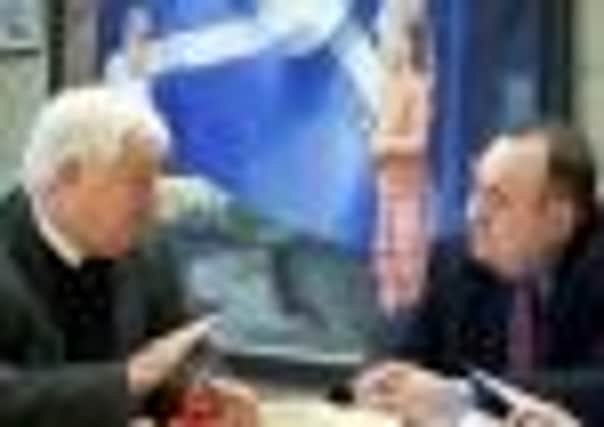Tristan Stewart-Robertson: Tuning out the world is a dangerous policy


Alex Salmond wants to get rid of BBC Scotland. the First Minister may not realise it, but TalkTalk has already done that for him.
For the past six months, I have been in the unique position to have no access to BBC Scotland on my television. Last month, I lost STV as well.
Advertisement
Hide AdAdvertisement
Hide AdTalkTalk, my provider of these services, quietly removed the non-English options from its offerings on the theory nobody would notice because they still get all the channels through Digital Terrestrial Television (DTT) connections. Unfortunately, I don’t have that, so I just lose the channels.
The TV/broadband/phone provider confirmed the changes were made in February, associated with its on-demand internet TV service, YouView, which has now launched and is a joint venture with others including the BBC and BT.
Maybe nobody else in Scotland was affected. Maybe nobody cares. I’m unwilling to pay for a TV engineer to come out, and I can’t say I’m missing BBC Scotland or STV – though I mean no offence to those who work there.
For months, I have enjoyed watching Newsnight without having to brace for an awkward cutaway to the Scottish edition. Many times there were good debates and important national and international stories that were interrupted because Newsnight Scotland needed to debate, for the nth time, the inability to debate anything with civility on independence. It’s always the same people on the same subject anyway, so what am I really missing?
By the time of Reporting Scotland at 6:30pm every night, I have already read all the relevant BBC coverage on its website. And should I need to watch a BBC Scotland investigation or local STV report, it’s all online.
The long talked about idea of a ‘Scottish Six O’Clock’ news, where Scotland looks outward and reports on items beyond the central belt for a full hour might entice me back someday. But TV news isn’t really set up for “the national” anymore. Like much of North America, it is becoming more localised, more parochial and more insular.
Mr Salmond says viewers are being “short-changed” by Westminster broadcasting policies. A policy from Westminster’s TV slaves Ofcom will deliver local TV channels for Glasgow and Edinburgh, with winning bids expected to be announced next month. STV has joined with Napier University and Glasgow Caledonian University to bid for the channels.
In 2008, there were proposals for a Scottish Digital Network based on money from the licence fee. Proposals for redefining TV are not new and will not end, even after 2014. TV, like all informaton sources, competes with a bigger gorilla in the room than political power: the internet.
Advertisement
Hide AdAdvertisement
Hide AdAll the variations on a TV theme talk about output hours and cash funding.
They don’t address quality. You can throw endless money at something, but that doesn’t guarantee it will work. As important as the independence debate may be, you cannot talk about it four nights a week on Newsnight Scotland for the next two years. That is a sure fire way to ensure nobody turns up on polling day except for party faithful.
As a news junkie, I seek out information and the more rare “knowledge” and the near extinct “wisdom” from a variety of countries, particularly my home Canadian nation. But there must be a degree of push from the information providers. They must go TO the audience, not simply wait for them to appear.
Now, TV is debating its own existence in Scotland with the suggested replacement of the BBC north of the future electrified equivalent of a Hadrians Wall with the Scottish Broadcasting Company (SBC). The perceived problem of the current “state” broadcaster is that it is biased towards the UK state and not the Scottish state. This would merely be reimagined in a new network run by the Scottish state, dictating what is allowed over the electrified wall. Either way, a state is deciding what you are allowed to watch.
For all the perception of bias of state media, private business has the same problem. Market forces deliver reality TV, not news. Independent media is rarely independent of everything, even in independent states – in fact, even less so. The province of Quebec, currently in the midst of one of its nastiest provincial elections in living memory, is driving ever further into an isolationist, protectionist and sometimes racist mindset in the name of protecting “culture”. The probable incoming premier’s Parti Quebecois had to climb down from her suggestion anglophones would be forced to speak French.
The danger of obsessing over internal and local content for media and society is that you easily do so to the exclusion of all other thoughts, opinions and creativity.
And that’s a powerful factor in my current enjoyment of freedom from Scottish broadcasting.
With a possible SBC televised revolution after 2014, what content will we be allowed? What will be the quality of debate? If independence is achieved, will Scotland have anything left to talk about?
Advertisement
Hide AdAdvertisement
Hide AdMissing Newsnight or the STV equivalent currently puts me at no disadvantage in either the independence debate, nor as a reporter generally. Media has to consider how effectively it reports at a local level, debates at a national, and looks outward internationally. It fails to do so at the moment and every viewer must question how either SBC or BBC Scotland/STV will manage those roles in the future, whatever decision the people make in 2014.
Until then, I will continue as a forced English TV viewer in a Scottish living room, and feel no loss because of it.